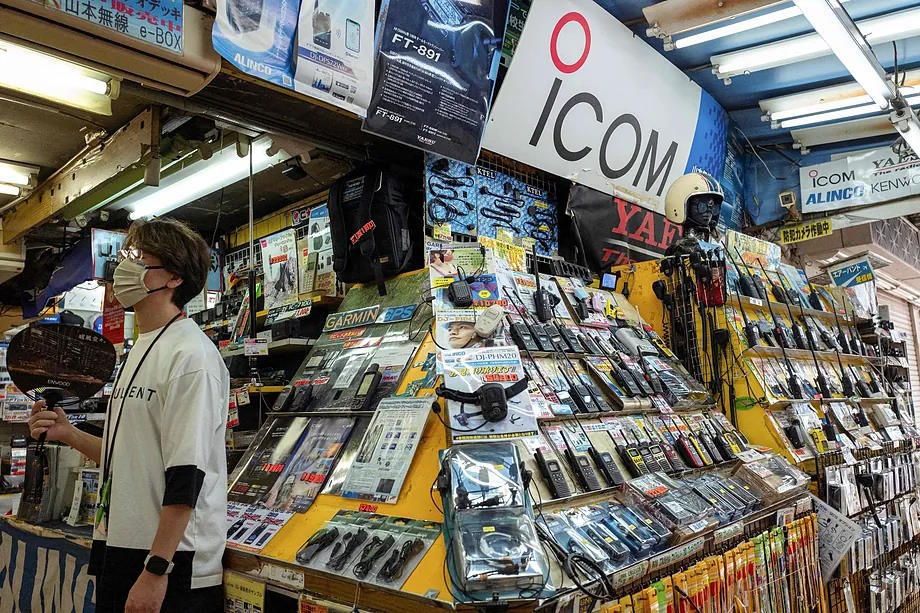Pagers filled with up to 56 grams of explosive material labeled 'Made in Taiwan' but produced in Hungary by an alleged Israeli ghost company; Japanese walkie-talkies that have not been manufactured for 10 years and could be old counterfeits. Who made the explosive devices for Hezbollah? Many mysteries remain to be solved around a mysterious and shadowy supply chain that goes through Japan, Taiwan, Hungary, and Lebanon.
Let's start with the second round of explosions on Wednesday targeting the militant group Hezbollah. At least 20 people have died and more than 450 were injured in Lebanon. Images published by various local media and agencies showed that the explosive devices were ICOM walkie-talkies, with model number IC-V82 and labeled 'Made in Japan'.
ICOM, based in Osaka and founded in 1954, is a well-known manufacturer of wireless communication products sold in over 80 countries worldwide and with subsidiaries in Spain, the United States, China, Australia, and Germany. On Thursday, the company released a statement stating that they have not manufactured the portable radio model that has caused so many deaths in Lebanon for a decade.
The company detailed that from 2004 to October 2014, the IC-V82 was being manufactured and sold to foreign markets, including the Middle East. However, both the production of that model and its batteries - where the explosive material was found - were discontinued. "The devices' photos did not show the holographic label that ICOM had attached to the units to prevent counterfeiting, so we cannot confirm if the product was sent from our company," the statement adds.
Following the official company statement and in statements to the AP agency, Ray Novak, an executive of the Japanese manufacturer, stated that the devices in Lebanon appeared to be imitation. "I can guarantee you that they were not our products," he replied. Novak also explained that the V82 two-way radio was the preferred model for radio enthusiasts for use in social or emergency communications, even by people tracking tornadoes or hurricanes.
Both ICOM and the Japanese government have stated that they are investigating the incident with the walkie-talkies. One of them exploded near a funeral organized by Hezbollah for its fighters killed during Tuesday's explosions: 12 dead, including two children, and over 3,000 injured after the explosion of pagers acquired about five months ago, as well as the portable radios (whose exact origin is still unknown).
Initially, the focus on the manufacturing of the pagers was on Taiwan. There is where the company that allegedly manufactured the model used in the attack on Hezbollah is located. However, on Wednesday, this Taiwanese manufacturer, Gold Apollo, stated that the devices were actually manufactured under license by a company called BAC Consulting, based in Budapest. The Taiwanese government added that there were no records of the model of those devices (AR924) leaving the island for Lebanon or any other country in the region. "Gold Apollo sent around 260,000 pagers, mainly to the United States and Australia, between early 2022 and August 2024," the Taiwan Ministry of Economic Affairs noted in a statement.
Hours later, Hungarian authorities claimed that those pagers were never in their territory. "BAC is a commercial intermediary without production facilities or other operations in Hungary," a Hungarian government spokesperson stated.
"The design and manufacture of the products are the exclusive responsibility of BAC," reiterated Gold Apollo, explaining that they established a relationship with the Hungarian company three years ago. "Initially, the European partner only imported pagers and communication products. Later, BAC said they wanted to manufacture their own pagers and requested the right to use the brand," a statement from the Taiwanese company reads.
The New York Times reported, citing anonymous sources, that Israel concealed explosives inside these devices and added a switch to each one, which was later used to detonate them remotely. The same newspaper points out that BAC Consulting is a ghost company run by Israeli intelligence officers and that, although the pagers began to be sent to Lebanon in 2022 - the year the company was founded - the supply increased when Hezbollah said they would not use mobile phones for their communications because they were easily manipulable.
The executive director of BAC Consulting is listed in records as a woman named Cristiana Barsony-Arcidiacono, who, in a phone call with NBC News, confirmed that the company worked with the Taiwanese Gold Apollo but did not manufacture the pagers. "I am just the intermediary," she stated.
